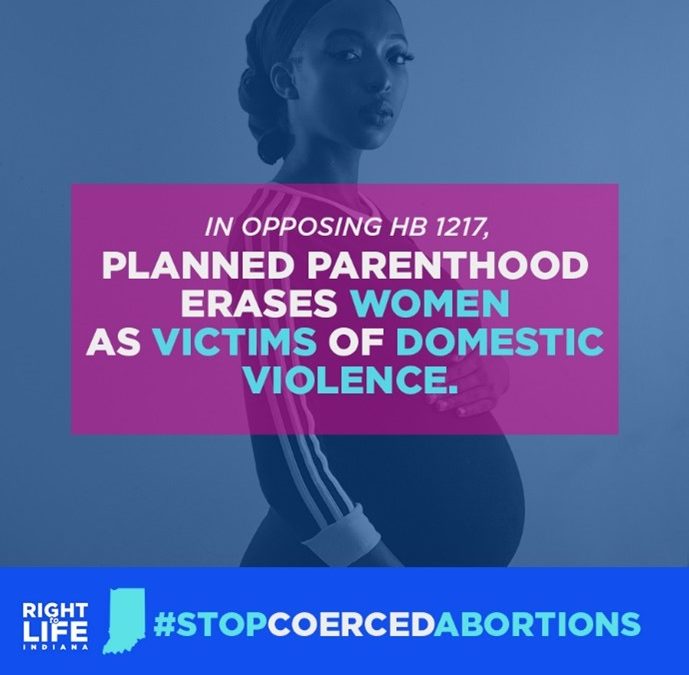In Indiana, a new law aimed at stopping coerced abortions, HEA 1217, will go into effect July 1. The new law’s safeguards (found nowhere else in current law) offer help to victims of human rights abuses, such as domestic violence, child abuse, and human trafficking, providing a possible lifeline to women, girls, and unborn children in dire circumstances.
But one group spearheaded efforts to kill these new anti-coercion protections.
That group is Planned Parenthood. The once emphatic defender of “women’s health care” and “women’s choice” has once again revealed itself as an obvious foe to both.
Planned Parenthood now condemns Governor Holcomb for signing HEA 1217.
Citing no sources, the abortion group said, “This bill is particularly concerning because restricting access to abortion care puts pregnant people at an even greater risk of experiencing IPV by forcing people to stay in a relationship with an abusive partner. HB 1217 could actually increase intimate partner violence and reproductive coercion, not reduce it.”
Here is the reality:
HB 1217 does not “force people to stay in a relationship with an abusive partner.” The bill stipulates that suspected victims of coerced abortion must be provided with information about assistance, counseling, protective services, access to a phone if they need to make a private call, and access to an alternative exit from the facility—all safety measures to protect her from an abusive partner.
Furthermore, law enforcement is required to immediately initiate an investigation into the reported coercion. Workers at the abortion facility are tasked with making that assessment. In the case that coercion is suspected, the situation takes on a whole new level of gravity.
In those cases, shouldn’t abortion workers be more concerned with the protection of the pregnant woman instead of the preservation of some bumper-sticker slogan about “abortion access”? What are Planned Parenthood’s priorities?
Not women. The group made no mention of “women” or “girls” in its whole 562-word email, erasing them as victims of abuse in favor of the bizarre but woke phrase, “pregnant people.” (This from the group that has also tweeted, “Some men have a uterus.” many times over.)
Setting Planned Parenthood’s politics aside for a moment, let’s return to the conversation about female victims of coerced abortions, lest they be forgotten again.
According to a 2017 survey published in the Journal of American Physicians and Surgeons, 75 percent of women who had an abortion said they experienced “at least subtle forms of pressure to terminate their pregnancies.” Nearly 1,000 women participated in that survey.
Almost 30 percent of those surveyed admitted that they were “afraid that they would lose their partner” if they didn’t abort their babies. Almost half said they believed their unborn child was a human being at the time of the abortion.
Beyond this survey and some others, data on coerced abortions is sparse. As a result, Planned Parenthood and other abortion advocates have attempted to minimize the significance of coerced abortions as a form of reproductive coercion.
Yet any amount of common sense tells us that abusers (who don’t tend to care about the dignity of human life in the first place) would be eager to “get rid of” any evidence of abuse, including an unborn child. After all, pregnancy, birth, postpartum healing, and a lifetime of mothering are all incredibly inconvenient to abusers such as sex traffickers.
Indeed, statistics show that more than half of trafficking victims have had at least one abortion.
According to a report from The Charlotte Lozier Institute, “Laura Lederer, president of Global Centurion and nationally renowned expert on human trafficking research, published retrospective study results in 2014 which show that while trapped in trafficking: 71 percent of victims got pregnant at least once; 21 percent got pregnant five or more times; 55 percent had at least one abortion; and 30 percent reported multiple abortions.”
This was while trapped in trafficking.
There is an undeniable link between abuse and abortion. How strong that connection is can more fully be assessed if there are better protections and reporting requirements, which Indiana’s new anti-coercion law offers.
One has to wonder: If coercion isn’t happening on a grand scale in the state of Indiana, why should Planned Parenthood so much as flinch at this bill?


Recent Comments